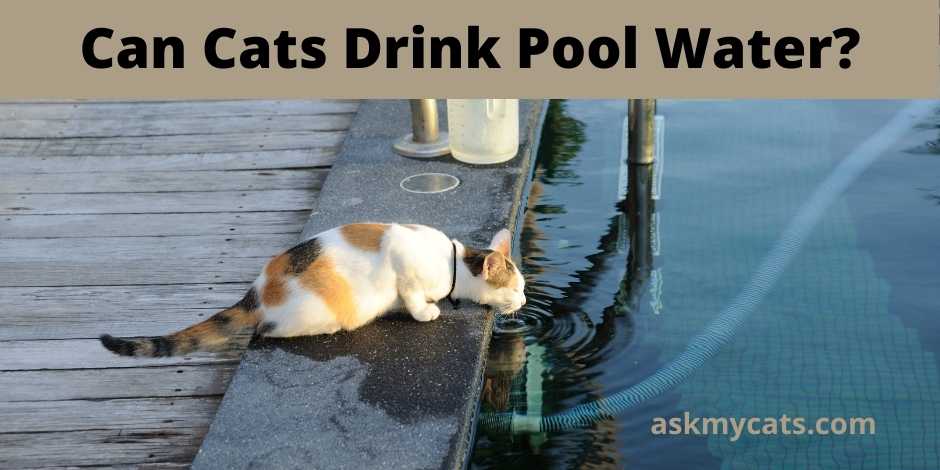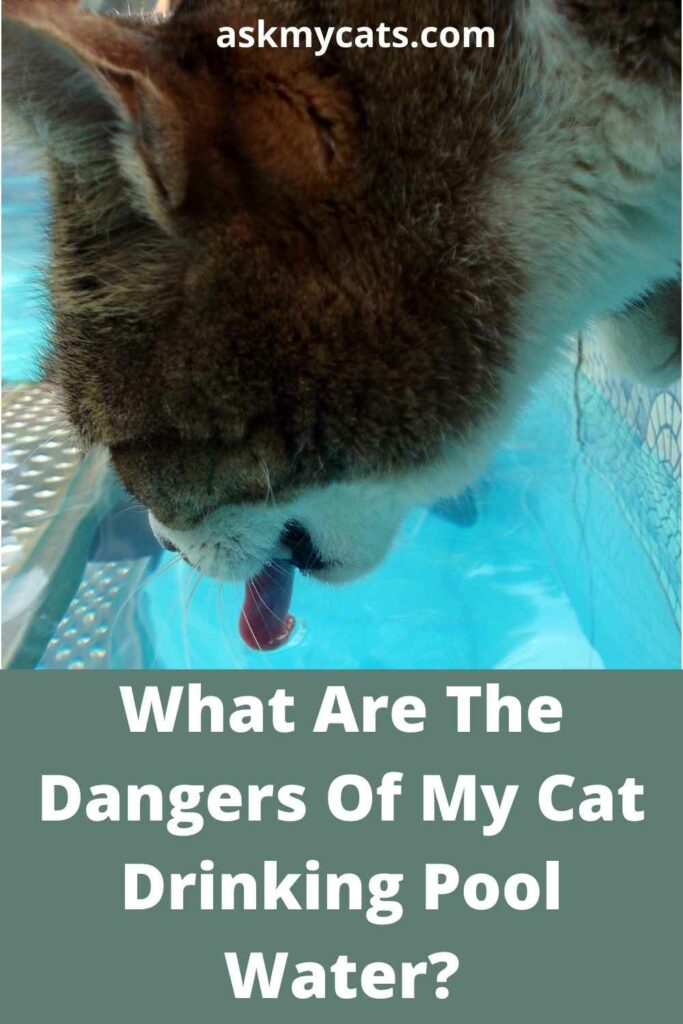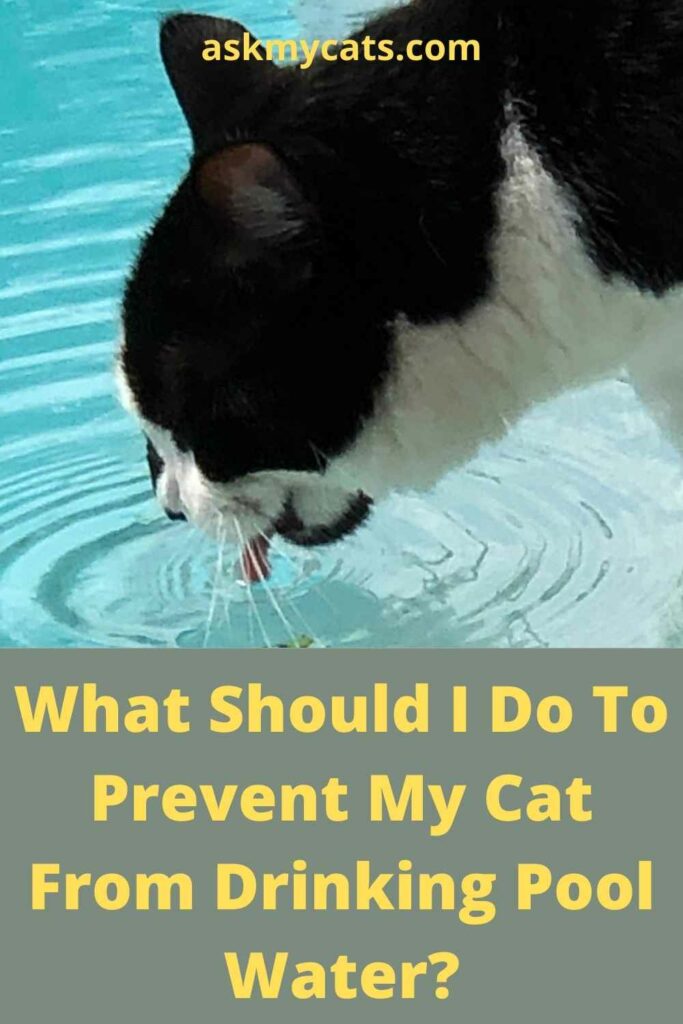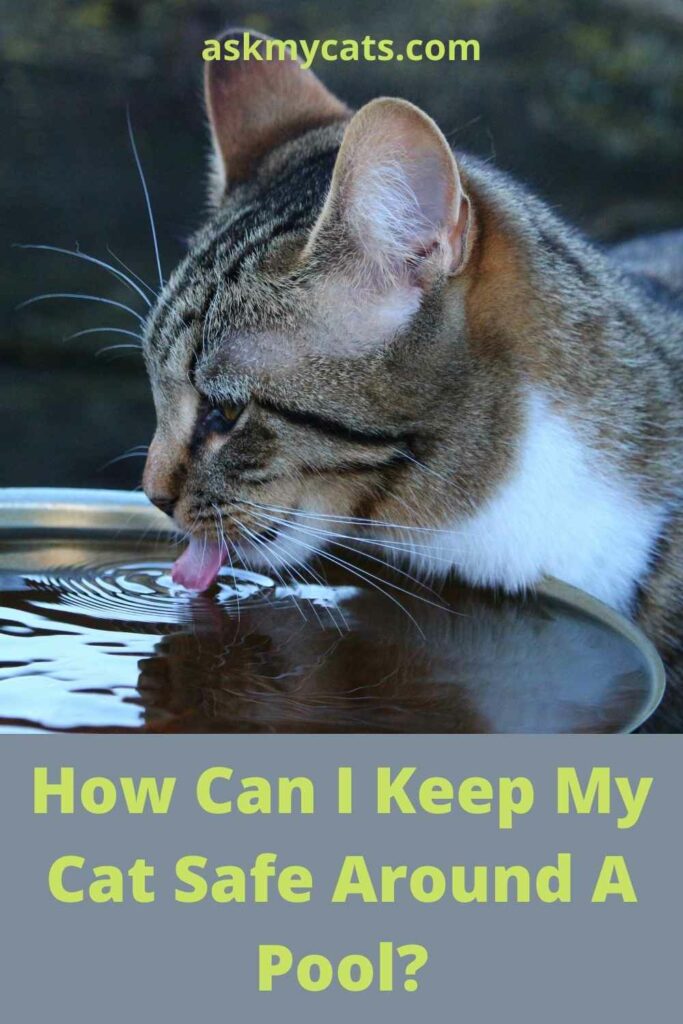Fresh drinking water should always be available to your feline for their good health. During the summer months, it may be tempting for your fluffy companion to take long drinks from your pool, which appears to be cold and clean.
Yes, cats can drink pool water. We do not, however, recommend that they do so. If the pool’s chlorine level is low, your cat should be okay. Large quantities of chlorine, on the other hand, may be harmful to your cat’s health.
Although issues are rare for cats who drink pool water on an unintentional basis, dangers can occur. Pet owners and pool owners should take steps to avoid issues.
Keep reading to learn more about the effects of pool water on your feline.


Give Your Cat the Perfect Day
Get the Free Ebook!
Do Cats Like Pool Water?
While it hasn’t been scientifically confirmed, it’s thought that cats are attracted to the scent of chlorine in pool water because it triggers a comparable response to pheromones.
Pheromones are essentially signals left behind by cats in the form of a smell. Other cats catch up on these odors and have an uncontrolled reaction to them. This generally entails a lot of rolling around on the floor.
Chlorine has a strong and distinct odor. However, regardless of whether we enjoy the fragrance or not, it does not have the same releasing impact on humans as it does on cats.
No one has been able to determine the specific ingredient that is producing the reaction, but chlorine is essentially calcium hypochlorite. So that is most likely the culprit of your cat liking pool water.
How Can Pool Water Affect My Cat?
Handling chlorine in its concentrated state before it is poured in the pool poses the greatest risk to cats. Chlorine pills should be maintained in their original containers in a secure location away from pets and children.
Chlorine gas can be harmful if breathed, and pure chlorine can cause skin and eye irritation.
Because the smell of chlorine tablets is typically unpleasant to dogs and cats, it would be quite rare for a pet to consume them. However, appropriate storage should completely remove the risk of chlorine poisoning.
What Are The Dangers Of My Cat Drinking Pool Water?

The dangers of your feline drinking pool water are:
1. Toxins
Pool chemicals, such as chlorine and algaecides, are used to maintain the pool clean and free of plant life. Despite their usefulness in pool care, these chemicals can be harmful to pets in the home.
Because individuals frequently drink pool water by mistake, the levels of these poisons are purposely low to prevent damage. The odd tiny drink of pool water will not cause any problems for most feline.
Large amounts of pool water, on the other hand, might cause irritation or burns to the oesophagus. A life-threatening response might also develop if the cat is allergic to the chemicals in the pool.
2. Microorganisms
Bacteria and fungus like swimming in pools. Chemicals are used to control these potentially dangerous bacteria in a properly maintained pool. However tiny quantities can persist even in the best-kept pool.
One such bacteria found in pools is Escherichia coli (E. Coli). Microorganisms like E. Coli cause illness when eaten.
Although the odds of a pet acquiring E. Coli or any microorganism-related ailment by drinking pool water are slim, they do exist.
3. Aspiration
When water or any foreign substance enters the lungs, it is called aspiration. Due to incorrect posture when drinking or the sheer volume of water available, cats drinking pool water may inadvertently aspirate water.
Coughing, choking, and regurgitation of the water swallowed are common symptoms of aspiration. Pneumonia can occur if a substantial amount of water stays in the lungs.
Aspiration pneumonia is a dangerous medical condition that requires prompt medical attention. Symptoms include difficulty breathing, loud breathing and a blue tinge to the lips and gums.
4. Stomach Upset
The most prevalent issue connected with dogs ingesting pool water is stomach discomfort. Cold water, as well as water that is excessively loaded with chemicals, raises the risk of stomach discomfort.
Dogs and cats who drink pool water rapidly to avoid dehydration are more likely to have stomach distress. Vomiting and pain are common symptoms of stomach distress caused by pool water use.
Though stomach distress is rarely a life-threatening condition, recurrent vomiting can lead to dehydration, which can be fatal.
What Are The Risks Of My Cat’s Exposure To Pool Water?
Drinking chlorinated pool water might cause slight GI discomfort in pets, but it shouldn’t be a major problem.
Fortunately, most chlorine-related symptoms are mild. Long-term swimming in chlorinated pool water can cause sensitivity symptoms in cat, such as red eyes and itchy skin.
Pools with high chlorine levels, especially in poorly ventilated locations, can irritate the airways owing to chlorine gas emission.
Ear infections are more common in cats that swim often. While some owners believe this is due to chlorine exposure, recurring infections are more likely due to moist ears than chlorine.
If your pet is prone to recurring ear infections, your veterinarian might prescribe a drying treatment to use after swimming.
Are There Alternatives To Chlorine In The Pool Water?
If you’re still concerned about the risks of chlorine, you might want to try buying a bromine-based replacement. Although more costly, there have been less reports of inflamed eyes and skin.
Bromine is the most often used chlorine substitute in pools. Bromine is a close relative to chlorine, although it has a milder odor and less bleaching adverse effects.
While some individuals prefer bromine to chlorine because of its gentler characteristics, it is more costly.
Bromine, on the other hand, loses its stability when exposed to sunlight. Thus, it may not be the ideal choice for an outdoor pool.
Another option is to purchase a wading pool to use outside and fill with water using the hose. This helps your to stay cool while being safe. Also, many cats prefer to lie in the warm, shallow water than swim.
Can Cats Drink Salt Pool Water?
Cats, unlike humans, have biological bodies capable of processing salt water. Their kidneys are capable of filtering out the salt, allowing the water to hydrate them.
While it is acceptable for your cat to drink from saltwater pools on occasion, and they can tolerate more salt than dogs, this does not indicate that they should ingest huge amounts of salt.
If you want to learn more about cats drinking saltwater, we recommend checking out our other article “Can Cats Drink Salt Water?”.
What Should I Do To Prevent My Cat From Drinking Pool Water?

You can try the following things to prevent your cat from drinking pool water:
1. Supervision
The importance of supervision cannot be overstated. It is critical that you never leave your cat in the pool unattended.
If your cat falls in, she may ingest a lot of water. They’ll be distraught and scared, and they might not be able to pull themselves out.
2. Pool Toys
When you’re not around, never leave toys or floats in the pool. When left alone, these may tempt your feline to leap or fall in.
3. Clean Water
Make sure there’s always fresh water nearby so your pet doesn’t end up drinking the pool water to relieve their thirst.
4. Protect Your Pool
Consider getting a cover or net to keep your dogs safe when you let them out in the yard if your pool isn’t fenced in or shut off.
How Can I Keep My Cat Safe Around A Pool?

Try the following to keep your feline safe around a pool:
1. Buy Pet Life Vest
You should consider purchasing a pet life jacket. In the same way that life jackets aid people with buoyancy and remaining above water, they can also benefit cats.
If you know there will be some four-legged pals surrounding the pool, put one on to keep them safe. Many pet shops and internet retailers sell pet life vests.
2. Teach Your Cat To Swim
Cats, like humans, can undergo swimming lessons. You may do it yourself or hire an animal trainer to ensure that they are learning properly.
3. Learn Animal CPR
Animal CPR can aid in the rescue of cats and dogs that have fallen into a pool and require assistance.
When it comes to animals, it’s critical to understand how to do things correctly. Check with your local animal shelter to see if any lessons are available. If not, a reputable animal welfare group should be able to assist you.
4. Put Up A Pet Pool Fence
Installing a fence around your pool is one of the most effective ways to keep a pet from slipping into it. These fences assist to keep cats out of the pool while still enabling you to enjoy the view. They’re also a great way to keep older pets safe from falling over.
Frequently Asked Questions
Is It Okay For Cats To Drink Swimming Pool Water?
Is Pool Water Bad For Pets?
Can A Cat Swim In Water?
Final Words
Overall, pools may be a safe and enjoyable pastime for you and your cats if you exercise caution. However, cats, like children, must be watched at all times and must adhere to standard pool safety procedures.
Fortunately, the chlorine concentration in the entire pool is minimal since chlorine is dispersed with so much water.
Furthermore, cats do not drink a lot of water. So, your feline should be okay.
However, you should keep an eye on her and contact your veterinarian if she isn’t feeling well. There is nothing to be concerned about for your cat. However, if you notice a pet drinking from a pool, stop them immediately and offer them fresh, pure water.
We request that you drop down your queries regarding your feline friend in the comment section below.
